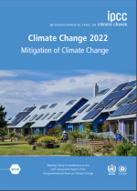The Intergovernmental Panel on Climate Change (IPCC) released its sixth Assessment Report (AR6) on the mitigation of climate change, focusing on the science and technology of limiting global warming to 1.5°C above pre-industrial levels.
The report states that limiting global warming to 1.5°C will require rapid, far-reaching, and unprecedented changes in all aspects of society, including energy systems, land use, urban infrastructure, and industrial processes.
To limit global warming to 1.5°C, it recommends the rapid and sustained reduction of greenhouse gas emissions, particularly carbon dioxide, in all sectors of the economy. This will require a rapid transition to low-carbon energy sources, such as renewable energy and nuclear power, as well as the adoption of energy efficiency measures and the decarbonisation of transport, industry, and buildings.
Rapid and deep changes in demand make it easier for every sector to reduce GHG emissions in the near and mid-term, which can be applied to decarbonise transport. When it comes to aviation, frequent flyers, often associated with corporate flying, need to start considering other ways of transport. Business travel represents approximately between 15% and 20% of global air travel. The greatest avoid potential comes from reducing long-haul aviation and providing short-distance low-carbon urban infrastructures. Two years after the pandemic, companies have integrated virtual technologies into their business models which can be an efficient way of avoiding long-haul flying for meetings. For short-distances and regional travel, high-speed trains are a much more sustainable option.
The report notes that the costs of mitigating climate change are substantial, but that they are outweighed by the benefits of avoiding the worst impacts of climate change, such as food and water insecurity, displacement, and conflict.
Overall, the report concludes that limiting global warming to 1.5°C is technically and economically feasible, but will require urgent and sustained action by all sectors of society. The report emphasises the importance of a collaborative and integrated approach to mitigating climate change, involving governments, businesses, civil society, and individuals.
Urgent emissions mitigation – reducing long-haul aviation – shift to rail

